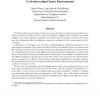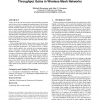87 search results - page 7 / 18 » What makes workflows work in an opportunistic environment |
CLUSTER
2005
IEEE
14 years 1 months ago
2005
IEEE
Cycle-harvesting systems such as Condor have been developed to make desktop machines in a local area (which are often similar to clusters in hardware configuration) available as ...
GROUP
2007
ACM
13 years 11 months ago
2007
ACM
The tension between privacy and awareness has been a persistent difficulty in distributed environments that support opportunistic and informal interaction. For example, many aware...
LREC
2010
13 years 9 months ago
2010
eScience - enhanced science - is a new paradigm of scientific work and research. In the humanities, eScience environments can be helpful in establishing new workflows and lifecycl...
EDBTW
2010
Springer
13 years 5 months ago
2010
Springer
Nowadays, due to the lack of face-to-face contact, distance course instructors have real difficulties knowing who their students are, how their students behave in the virtual cour...
IMC
2009
ACM
14 years 2 months ago
2009
ACM
A flurry of recent work has focused on the performance gains that may be achieved by leveraging the broadcast nature of the wireless channel. In particular, researchers have obse...


